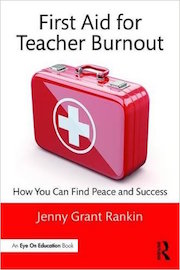First Aid for Teacher Burnout: Avoid Toxic Traps
Teachers have plenty of justifiable reasons to complain about their jobs. Yet there are thousands of teachers who love their jobs. Loving your work as a teacher and experiencing peace and success on a daily basis are certainly within your reach. The first step is to ensure your mindset is primed for any changes that need to take place. Attitude is definitely not everything, but it certainly is a lot.
Avoid Toxic Traps
One of the primary hazards for teacher burnout is the presence of negative colleagues, which can include negative superiors, and these stakeholders’ cynicism and negativity can spread like an infectious disease (Skovholt & Trotter-Mathison, 2011).
“Do not allow people to dim your shine because they are blinded. Tell them to put on some sunglasses.” — Lady Gaga
Some negativity culprits might even be your close friends. The following strategies can help teachers avoid toxic talk. Apply these strategies as appropriate for your circumstances.
► Avoid complainers. Trying to remain upbeat in the face of negativity is taxing and time consuming. Educator author Annette Breaux (2015) suggests claiming to be on your way elsewhere, such as to the bathroom, when a negative colleague tries to corner you.
A colleague might warrant this level of avoidance or conversation shifting if he or she:
- regularly blames administration, parents, or students for issues within the classroom.
- seems to have “given up” on making this a worthwhile job.
- is an overall downer, usually seeing the negative in a situation rather than seeing (or searching for) the positive.
- cannot control his or her temper.
- spends more time complaining than focusing on solutions.
► Avoid gathering areas where negative talk is commonplace. For example, sometimes time in the teachers’ lounge causes more harm than good. Since it is best not to isolate yourself, arrange for a regular lunch date in someone’s classroom with a few teachers you regard as positive influences.
► Suggest solutions. When a colleague complains to you, first affirm the gripe (e.g., “That must be so frustrating; I’ve had that happen, too”) and then model constructive thinking (e.g., “I find it helps to…” or “I wonder if it would help if you…” or “You might want to talk to…”). Each teacher makes a contribution to the school’s culture, and you would be helping the culture, helping your own mindset, and possibly helping your colleagues find solutions.
► Share your burnout efforts. If a negative colleague is also a friend with whom you’d like to remain close, talk to him or her about your own efforts to avoid burnout. Share what you’ve learned about the power of positive thinking and ask him or her to help you infuse positivity into your conversations.
► Talk to your educator leaders if toxic conversation derails collaboration time. For example, if staff meetings become gripe sessions, point out to your administrators that you find this discouraging. If grade-level or department meetings digress into toxic forums, tell your grade/department chair that you find this discouraging.
► Identify your burnout triggers. For example, if you feel especially exhausted after lunch, rethink the way you spend that time. If talking to your principal is likely to exacerbate you, wait to reach out to her until a later time. Triggers force us into a survival mode in which we are less effective, whereas identifying triggers can help us resist them (Schwartz, 2010).
 Amend Toxic Thinking
Amend Toxic Thinking
Expansive research has shown that the view you choose to have has a profound impact on how you behave and the results you achieve (Dweck, 2007). For example, nurses who enlisted positive thinking and avoided negative thinking were found to prevent and alleviate burnout (Espeland, 2006). The same is true for teachers, who also work demanding jobs caring for others. One commonality among teachers who last in the profession despite its many obstacles is they remain hopeful about their role in society, communities, and students’ lives (Nieto, 2015).
The following strategies can help you avoid toxic thinking. Apply these strategies as appropriate for your circumstances:
► Decide things you cannot control are not worth thinking about. For example, a teacher profiled in my recent book acknowledged the strains that students’ at-home technology habits have on their attention spans. But as a teacher, you cannot directly control how many hours of TV your students watch at home. Thinking about the problem is thus not worth your time or energy. Tweaking your lessons to be more engaging, or putting your effort into another project, would be a more worthwhile focus in this case.

Carol Dweck
► Learn about growth mindset. Read the research or books (e.g., Dweck, 2007) by Stanford University psychologist Carol Dweck. Having a growth mindset will help you better deal with challenges and help you excel. Not only do educators benefit from having a growth mindset, but they model (such as through their comments and reactions) a growth mindset for their students. Students who have a growth mindset earn higher grades, show greater motivation in school, achieve greater academic success, and score higher on academic tests (Dweck, 2007).
► Find a healthy place to vent. Professional venting can help you guard against burnout (Skovholt & Trotter-Mathison, 2011). Sharing struggles and frustrations with a friendly colleague can break a teacher’s isolation and improve even the worst day of teaching (Rauhala, 2015). Share your frustrations with someone who cares and will sympathize but who will also encourage you to overcome obstacles. In other words, venting about your job is not the same thing as wallowing in negativity or ignoring ways you can prompt change.
► Journal your frustrations. Skovholt and Trotter-Mathison (2011) found that releasing negative emotions through writing can help practitioners guard against burnout. Writing has an added benefit in that you can take a break after journaling, perhaps when you are too frustrated to think of solutions, and then revisit your words when you are feeling less angry and more open to solving problems.
► Play the “swap it” game. It’s OK to have negative thoughts (you’re only human!). You just don’t want to get stuck there. When high school art teacher Christine Friedrich catches herself thinking about something negative, she stops herself and thinks about two positive things going on in her classroom instead. When you catch yourself stewing over a negative thought, try replacing it with a more constructive one (see, for example, Table 2.1).
If thinking up a constructive alternative to each negative thought is too cumbersome, simply use Table 2.1’s last thought (“Every obstacle can be overcome”) or other mantra every time you catch your mind dwelling in a negative place. The more you repeat a mental exercise, the more likely it will occur automatically (Schwartz, 2010).
► Find opportunities to laugh. Infuse appropriate humor (the positive, nonsarcastic kind) into your teaching, or peek at a joke-a-day website (like the K–12 Teachers Alliance’s www.teachhub.com/teacher-joke-day) between classes. Employing humor was found to prevent and alleviate burnout in the case of healthcare workers (Demir, Ulusoy, & Ulusoy, 2003; Puig et al., 2012).
To succeed in life, you need three things: a wishbone, a backbone, and a funnybone.” — Reba McEntire
Resources
- Download a reflection activity about teacher burnout that can be used individually or in a group.
- Read Jenny Rankin’s two-part series in Psychology Today, “The Teacher Burnout Epidemic.”
- References for this article.
_________________

Jenny’s 2017 book First Aid for Teacher Burnout: How You Can Find Peace and Success is available from Routledge/Eye on Education. She is an advocate for making data “over-the-counter” so it is easier and less stressful for educators to understand and use – a topic addressed in more depth in the book.


































This is a real keeper! It applies to a lot of fields, but speaking – er, writing – as a retired teacher – it should be added to a teaching intern’s bible.
Thank you so much! :-))
Thank you very much for featuring my ideas on MiddleWeb. I love what you do for middle school teachers (having spent the largest portion of my career as a middle school teacher), and I’m extremely honored to be featured on your site.
Super helpful for this time of year…thank you so much!
Thank you! :-))
Thank you for this insightful message. One of my favorites for teacher candidates and teacher leaders has been “Belief Guides Behavior!” Your message is practical and powerful. That’s a great combination.
Thank you for your kind words. “Belief guides behavior!” is a wonderful mantra! :-)